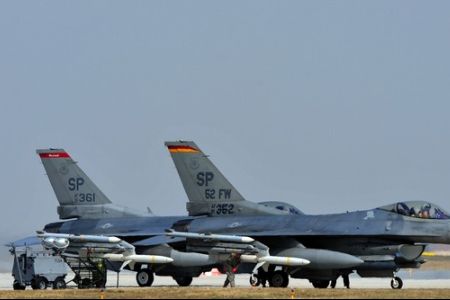The United States has agreed to a NATO’s request for a 48-hour extension of American participation in the Western coalition’s airstrikes on Libya
 The United States has agreed to a NATO's request for a 48-hour extension of American participation in the Western coalition's airstrikes on Libya.
The United States has agreed to a NATO's request for a 48-hour extension of American participation in the Western coalition's airstrikes on Libya.
Air Force AC-130 gunships, A-10 Thunderbolts and Marine Corps AV-8B Harriers will continue to attack troops loyal to embattled Libyan ruler Muammar Gaddafi and other sites through Monday evening, the Associated Press reported on Sunday.
The US is shifting the combat role to Britain, France and other allies; however, American air power is still in demand.
After Saturday, no US aircraft were to conduct airstrikes in Libya unless NATO officials would request it and Washington authorities would give their green light.
NATO will take the lead after the US participation on Monday strikes.
Meanwhile, fierce fighting continues between revolutionaries and regime forces on the outskirts of Brega. Opposition forces have withdrawn from the key oil town after an ambush by government troops on Sunday.
NATO has conducted 218 aerial strikes on Libya since it assumed control of military operations on Thursday amid concerns that the death toll among civilians is rapidly increasing.
According to NATO, warplanes belonging to to the military alliance carried out 184 sorties on Saturday alone, 70 of which were airstrikes as part of the mission, codenamed Unified Protector, aimed at "enforcing a no-fly zone and protecting civilians," Xinhua reported on Sunday.
The Saturday aerial strikes killed at least 13 Libyan opposition forces and several civilians were killed on the outskirts of Brega.
Speculations are rife about the real motive behind the war in Libya, with many analysts saying that under the guise of protecting civilians, as enshrined in the UN Security Council resolution 1973, Washington and its Western allies are basically after the North African country's vast oil reserves.
